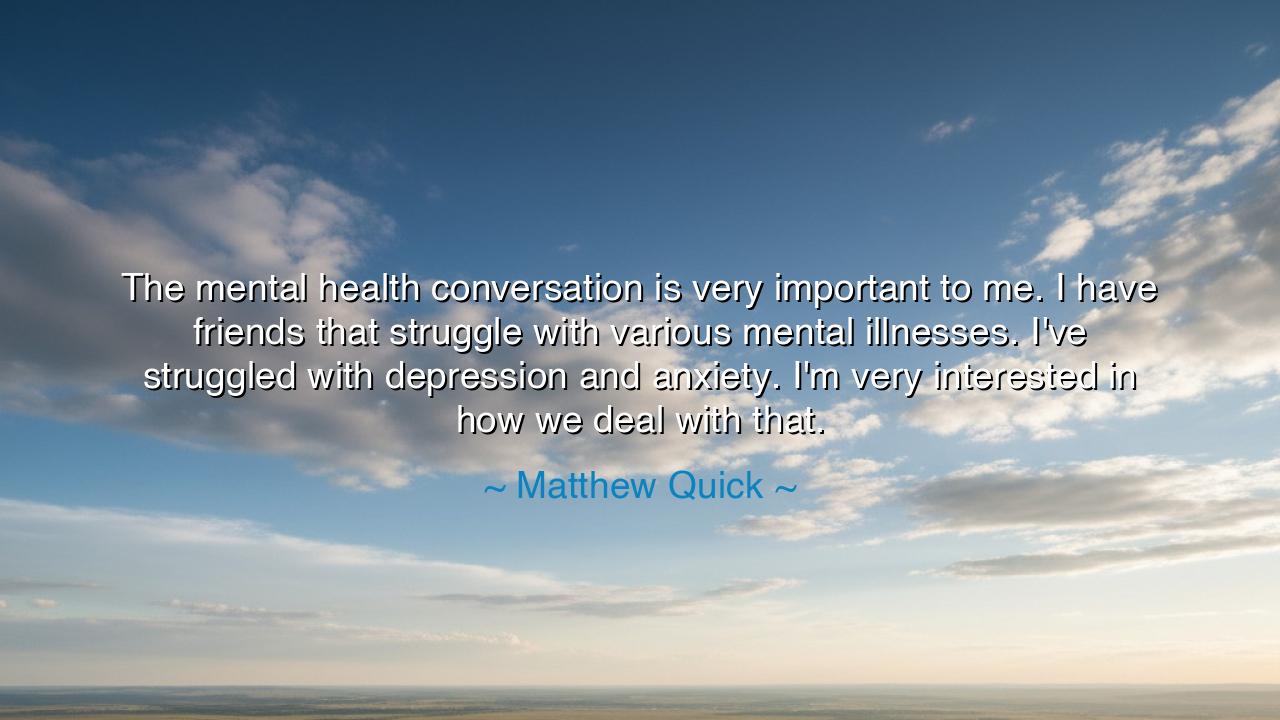
The mental health conversation is very important to me. I have
The mental health conversation is very important to me. I have friends that struggle with various mental illnesses. I've struggled with depression and anxiety. I'm very interested in how we deal with that.






The writer Matthew Quick, whose stories explore the hidden struggles of the human heart, once said: “The mental health conversation is very important to me. I have friends that struggle with various mental illnesses. I've struggled with depression and anxiety. I'm very interested in how we deal with that.” These words, spoken with humility and honesty, echo the eternal cry of humankind—the desire to understand suffering and to bring light to the places where the soul has grown weary. His confession is not a mark of weakness, but of courage, for to speak openly of pain in a world that prefers silence is an act of quiet heroism.
In the age of the ancients, the mind and soul were seen as sacred realms. The Greeks believed that balance between body and spirit was the foundation of health; the philosophers spoke of harmony within the self as the highest form of wisdom. Yet even they could not fully name the invisible storms of the mind—the despair that steals the will, the fear that tightens the chest, the sorrow that darkens the morning. Matthew Quick, in speaking of mental health, restores to modern ears what the ancients once revered: that the care of the mind is as vital as the care of the body, and that no healing is complete until the spirit itself finds peace.
The origin of Quick’s insight lies in both his life and his art. As the author of The Silver Linings Playbook, a story born of his own battle with depression, he sought to give voice to those who live unseen behind smiling faces. In his words, one hears not the voice of a scholar observing from afar, but that of a companion walking the same difficult road. He speaks not only for himself, but for the countless souls who wrestle each day with unseen burdens—anxiety, sadness, and the longing to be understood. By opening the conversation, he reminds us that healing begins not in isolation, but in connection.
Consider the story of Abraham Lincoln, one of the greatest leaders of his age, who was haunted by what he called “the black dog” of melancholy. Though revered for his strength, Lincoln’s letters reveal a heart heavy with grief and despair. Yet through his pain, he cultivated empathy, patience, and compassion. His struggle with mental anguish did not weaken him—it deepened him. Like Quick, he understood that the mind’s pain, when faced with honesty, can become the forge of wisdom. The difference between ruin and redemption lies not in the presence of suffering, but in how we deal with it—whether we face it bravely, or bury it in silence.
In Quick’s words, there is also a plea: that society itself must learn to speak more kindly about mental illness, to replace judgment with understanding. Too long have those who suffer been told to hide their pain, to “be strong” by pretending they are not wounded. But the ancients would have called such denial folly, for no disease can be healed by pretending it does not exist. The body is treated with medicine and rest; why then should the mind be treated with shame? To heal the soul, we must first give it permission to speak. The mental health conversation must be one of listening, empathy, and shared humanity.
There is a sacred strength in vulnerability. To admit one’s struggle, as Matthew Quick does, is not to surrender—it is to rise. The warrior who confesses exhaustion does not cease to be a warrior; he proves his courage by refusing to collapse in silence. Each time we speak openly about mental health, we strike a blow against the shadow of stigma that has long darkened human hearts. And each time we listen—truly listen—to another’s pain, we become healers in a world starving for compassion.
The lesson, then, is both simple and profound: speak, and listen. Do not be ashamed of your wounds; they are part of your humanity. Tend to your mental health with the same care you would give to a broken limb. Seek the company of those who understand, and offer your presence to those who are still afraid to speak. The path to healing is not walked alone—it is built by conversation, by courage, and by kindness.
So remember, O child of thought and feeling, the wisdom of Matthew Quick: to care for the mind is to honor the soul, and to begin the conversation is to begin the cure. Let us, then, speak with tenderness about the storms within us, for even the darkest cloud can yield rain that nourishes new life. The future of humanity depends not only on science and strength, but on compassion—and in that compassion, we find our truest form of health.






AAdministratorAdministrator
Welcome, honored guests. Please leave a comment, we will respond soon